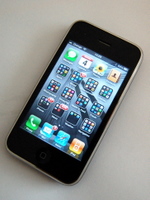Mobile phones and portable devices in schools
It has been reported over the last two days that mobile phones are to be banned in classrooms in England from September 2011, by Michael Gove, the Education Secretary. Yesterday's News of the World and today's Telegraph both contain references to this ban, linking it to new documents on behaviour and discipline that have been published today by the Department of Education. The DfE website quotes Mr Gove as saying to the News of the World:
I believe that more schools should be doing similar things, but I know that many teachers are concerned about the inappropriate way in which these devices are being used by students in schools today, and today's coverage is not likely to allay those concerns.
So, my question today is whether the new documents that have been published actually indicate that a ban on students taking these devices into classrooms is likely. Many have argued on Twitter and elsewhere today that it is.
I can only find one reference in today's documents to mobile phones, which reads as follows:
"I'll also give teachers the right to remove disruptive children from the classroom without fear of legal action. They will be able to search pupils for weapons, and items like iPods and mobile phones, and confiscate them".Firstly let me say that I am against the idea of a complete ban on mobile phones in schools. Used appropriately, smartphones and other student owned devices such as iPod Touches and Playstation portables can be used as very powerful aids to learning, and there are many schools who are making good use of these. Here's just one example from Notre Dame High School in Sheffield, who say
"The use of Mobile Devices has led to students being able to be more independent learners. Organisation has improved and homework quality has been of a good to high standard."
I believe that more schools should be doing similar things, but I know that many teachers are concerned about the inappropriate way in which these devices are being used by students in schools today, and today's coverage is not likely to allay those concerns.
So, my question today is whether the new documents that have been published actually indicate that a ban on students taking these devices into classrooms is likely. Many have argued on Twitter and elsewhere today that it is.
I can only find one reference in today's documents to mobile phones, which reads as follows:
There is a footnote after the mention of mobile phones and iPods etc which reads"Ministers have already announced their intention to make regulations to add to the list of prohibited items (cigarettes and other tobacco products, pornography, fireworks and specified personal electronic devices (mobile phones and iPods etc) and to legislate to introduce a broader search power including a power to search without consent for items banned under the school rules [my emphasis]. Changes in the law will be reflected in this guidance once they come into force."
So it would appear to me that the new documents are putting the decision where it should lie, with the school. And those of us who would like to see schools making more use of these devices to support teaching and learning effectively need to continue to make the case, based on the excellent examples of good practice which are out there. And we should use this opportunity through the DfE consultation on behaviour and discipline to argue the case that mobile phones should not be banned, but that decisions should be taken at school level, in an informed way."These are personal electronic devices which the member of staff conducting the search reasonably suspects have been used, or are likely to be used, to commit a criminal offence. An “offence” for the purpose of the Regulations includes anything that would be an offence but for the operation of any presumption that a person under a particular age is incapable of committing an offence"


Comments